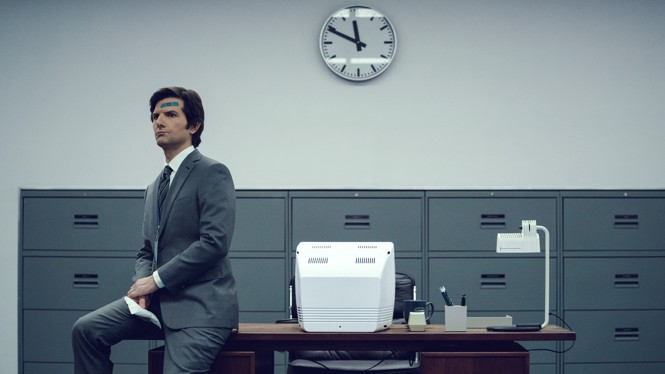Many people’s experience of work over the past two years, amid a global pandemic, has been one of invasion: Their job has infiltrated the personal sphere, colonizing space that used to be distinct. Apple TV+’s new series Severance jarringly reverses this impression. The show’s setup imagines a complete split between work and life, a “severance” between one’s professional and private selves. Mark (played by Adam Scott) works for a shadowy company that’s implanted a chip in his brain that divides his memory and perception; it gets triggered every time he steps into the office elevator. Work Mark has no idea what his life is like outside the office; home Mark has not even the faintest inkling of what he does for a living. Dream scenario? Not so fast. Mark’s company, Lumon Industries, has essentially taken over part of his brain. For that part of himself, work is now an experience that he can’t leave.
If this premise sounds unbearably sinister or philosophical, it’s rendered less so by Severance’s absurdist sense of humor. The show, created by Dan Erickson and produced and largely directed by Ben Stiller, owes a debt to Charlie Kaufman, but also to Black Mirror, George Saunders, the retro-futuristic Netflix series Maniac, and a grab bag of other speculative works delivered with an ironic shrug. It’s wacky, unsettling, and remarkably assured. The first shot hovers directly above a woman passed out on a conference table; the walls around her are padded, the only door is locked, the carpet is a nauseating shade of green, and her only point of contact is a voice on an archaic speaker asking her to complete a quick survey. It’s unclear whether she’s at work, in hell, stuck in an existentialist riddle, or posing for Henry Fuseli’s The Nightmare.
[Read: Maniac is a strange, hyperkinetic ode to connection]
Turns out it’s all four, kind of. The woman, Helly (Britt Lower), is being onboarded for her first day at Lumon, a cultlike corporation whose business is nefarious enough to warrant severing its employees’ minds from the outside world (imagine NDAs applied directly to the brain). In a cutesy turn of phrase, Lumon refers to its severed employees as “innies” and their nonwork selves as “outies.” Innie Helly, who can’t remember anything about her outside life, is appalled by her new reality: The second she leaves work, she’s instantly back in the office in a fresh outfit. Her “resignation requests” are all rejected (her outie self is the only one with the power to quit), leaving Helly to try to devise ever darker and more outrageous attempts to escape.
Mark, who’s recently been promoted to supervisor by his glacial, terrifying boss, Ms. Cobel (Patricia Arquette), seems oddly content to be permanently lodged in work mode. The first time we see him, he’s crying in his car in the parking lot outside his huge glass box of an office. Stepping into the elevator, he’s haggard and gaunt, until something flips, his eyes roll, and suddenly he’s a company man strolling cheerily through the chilly, fluorescent white corridors. Since Mark is the only character we really see existing in both spheres, Scott has to essentially play two characters, and he’s unnervingly good at it. In the first episode, we learn that he took the job because his grief for his late wife was so insurmountable that he preferred the idea of oblivion. (“I just feel like forgetting about her for eight hours a day isn’t the same thing as healing,” his sister observes.) Innie Mark is so obviously liberated from his outside self—lighter in posture, jauntier in tone, physically unburdened—that he presents all kinds of uneasy questions about consciousness, awareness, and free will.
[Read: Why TV is so worried about free will]
Severance is very funny while not actually seeming to be a comedy. (Arquette’s explosions of anger and Michael Chernus’s delightfully bizarre turn as Mark’s brother-in-law, a self-help author, come close to Dadaist performance art.) Similarly, Severance is thoughtful while shying away from an actual worldview—the show tends to toy with deeper meaning like a cat with small prey, batting it around in front of our eyes. There’s just so much going on. Every visual detail seems primed to evoke a specific emotional response or loaded with significance for some later reveal.
As detailed and expansive as the show’s world building is, the interactions—and inevitable bonds—between the innie characters are one of its best assets. Mark, smilingly acquiescent, and Helly, instinctively insurrectionist, seem positioned to change each other. You could almost lose count of the number of actors doing superlative work: John Turturro as Irving, one of Mark’s “macro-data” refiners; Christopher Walken as Burt, the chief of the Optics and Design division, which has a mythological rivalry with Mark’s section. Tramell Tillman is uncannily menacing as Mr. Milchick, Ms. Cobel’s grinning underling, who appears—like her—to have not been severed, and thus to be more fully involved in Lumon’s enterprises.

Escape at Dannemora, the previous series Stiller directed and produced, was decorative to the point of self-indulgence, ponderously eking out its minimal action over seven episodes when three would have done. Severance is much more compelling, mostly because of all the mysteries contained within it. (Why, if the employees have been severed, is the nature of their work still opaque? Why is Lumon so strange? Why is “defiant jazz” a genre on the company’s party playlist?) The danger of a show like this is that it promises more than it can deliver, that the theories unraveling in Reddit threads each week turn out to be richer and more twisted than the series itself. After watching all nine episodes, I came away half-gratified, half-maddened that the series seems to be withholding so much for a second, or third, season.
The show also steers away from any kind of obvious, Twilight Zone–style moralizing. Severance’s concept of separate versions of ourselves drafted into working on our behalf, fully conscious but robbed of agency, reminded me of the “cookies,” or digital replicated consciousnesses, in Black Mirror and that show’s obvious discomfort with the idea of the copy-pasted brain. But instead of one obvious twist that leaves you squirming, Severance proffers hundreds of tiny digs at workplace culture, white-collar burnout, and corporations that see employees as mere unmet objectives. When Lumon managers sense that their team members are struggling with the unnatural state of permanent work, they send them for “wellness checks” with an in-house counselor, much as Amazon reportedly sends its exhausted warehouse workers to “AmaZen” stations for guided meditations and other well-being activities.
But I can forgive Severance a lot because it’s easily the most fun of the metaphysical, have you ever questioned the nature of your reality mystery-box shows that have popped up over the past few years. It’s infinitely less ponderous than Devs or Westworld. As much as it has going on, it’s less chaotic than Maniac or Homecoming. It’s sweeter and more sincere than Mr. Robot or Black Mirror. For all of Severance’s existential angst about what work has come to, it seems to be sold in the end on the idea that human connection is all that counts—is all that’s truly inseverable.



